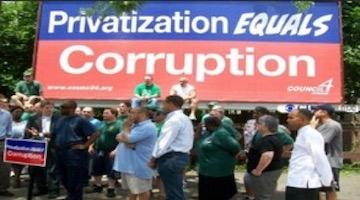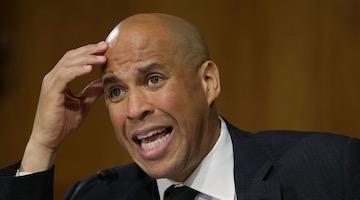The future of public education is not guaranteed. A corporate-financed “Cartel has infiltrated every level of the political structure by utilizing targeted campaign contributions and has cultivated major backing among public education’s traditional supporters.” The privatizers target heavily minority school districts and do not hesitate to manipulate data “to show fraudulent academic gains.”
This article was previously published in Black Commentator.
The Cartel has strategically launched and marketed a sustained attack on teachers and their unions with a steady stream of vitriol that demonizes each in turn.”
A Cartel of right-leaning corporations, foundations, Wall Street hedge fund managers, and wealthy individuals has geared up for an aggressive pursuit to privatize urban and suburban school districts across the nation. Using President Obama’s Race to the Top (RTTT) legislation (which the Cartel drafted) as an umbrella under which it promotes its privatization agenda, and with the ongoing assistance of U.S. education secretary, Arne Duncan, the Cartel has made significant gains. A close monitoring of its private-sector educational reforms has revealed some key marketing elements of these initiatives.
First, the Cartel has seized upon the legitimate frustrations and/or anger of parents, community activists, and average citizens about the contemporary challenges of public education – high dropout rates, low academic achievement, frequent student absences, etc. – in our large and small school districts. These problems have been aggravated by Cartel-influenced governors and state legislators who have systematically reduced funding for public education during the last decade. Parents and community activists want higher quality education outcomes; government officials and business leaders want lower taxes and reduced expenditures for the public-sector, in general; and school board members want respite from constituent complaints. With a slickly-packaged, educational medicine show, private-sector educational entrepreneurs have tapped into and have fomented this growing level of discontent. Trumpeting corporate and virtual charter schools, charter management organizations (CMOs), publicly-funded private school vouchers, and educational management organizations (EMOs), the Cartel pledges to raise achievement levels, reduce the dropout rate, improve instruction, upgrade school facilities, and install state-of-the-art educational technology in public schools. And it promises to do so for less money, although they often raise millions of additional corporate dollars to supplement the public funding. These strategically-marketed offers of more for less have strong appeal to the aforementioned groups, who consider themselves poorly served by the public school establishment. Moreover, the Cartel principally targets urban school systems that are financially strapped and predominantly and increasingly populated by poor students of color (African Americans, Hispanics, new Asian immigrants, Native Americans, and poor whites). Many of these school districts are headed by superintendents of color and governed by school boards where minorities have major impact. Given the seemingly insurmountable difficulties confronting these schools, they are ripe for the plucking.
“With a slickly-packaged, educational medicine show, private-sector educational entrepreneurs have tapped into and have fomented this growing level of discontent.”
Second, in order to facilitate productive negotiations with the central administrations and school boards of these school districts, Cartel member and allies have recruited minority leaders and educational administrators to serve on their staffs and boards. Although few minorities were included as original founders or shareholders of these for-profit educational entities, they have been employed as part of an overall marketing strategy. The majority male owners quickly realized that attempting to peddle their educational wares in largely minority populated school systems and cities, without minorities and women in high profile roles, would have been politically and economically untenable. In an era of increasing sensitivity to diversity, an all-white educational team promoting school privatization services and products to a predominantly minority public education body would have likely evoked perceptions of the worst kind of plantation politics.
Third, the tenure of urban superintendents and school board members has become shorter of late, problem-ridden, plagued by corruption (e.g., Chicago, Atlanta, Philadelphia, Washington, D.C., etc.), irrespective of the race and gender of the individual job holders and school board leaders. Thus, by serving as buffers between school officials and their residents, the Cartel is able to address the occupational survival needs of school administrators and their governing bodies. In this instance, the profit objectives of these privatizers of public education are congruent with the job security objectives of superintendents and school board members. The superintendents declare that they are bringing a positive resolution to the crisis in public education, while the school boards assert that they are engaged in break the mold, cutting edge educational reform. This quid pro quo is at the root of this alliance at the public trough. Additionally, the Cartel, through political contributions in mayoral, school board, and state legislative races, has established a foothold in a growing number of election districts throughout the nation.
Fourth, the Cartel has strategically launched and marketed a sustained attack on teachers and their unions with a steady stream of vitriol that demonizes each in turn. Teachers are labeled as uncaring, having low expectations for low-income and minority students, being racist and/or culturally insensitive toward the students under their charge, being in the profession for the money (although they are underpaid for the hours they actually work), and lacking the professional and educational competence to be effective in their jobs. The latter two indictments provided the basis for creating a system of merit pay and the evaluation of teachers via students’ standardized test scores. The Cartel has been skillful in advancing the refrain of “No Excuses” for students’ poverty; food insecurity; physical health, mental health, and vision problems; the impact of neighborhood violence, gang, and drug issues; and overcrowded, under-resourced classrooms. Missing from this analysis is any mention of the tens of millions of dollars that teachers collectively spend out of their own pockets each year to supplement students’ nutrition, buy their school supplies, and purchase students’ clothing. At the same time, teacher unions are branded as having minimal concern for students’ educational outcomes, only caring about raising teachers’ salaries. Unions have also been criticized for curriculum failures despite the fact that school district administrations set the instructional agenda. Elsewhere, the Cartel has recruited union members in California and Tennessee to challenge the union dues paying system as a way to implode the organization from within. These cases are headed to the U.S. Supreme Court where the probability for success is high given the Court’s conservative makeup.
“The Cartel, through political contributions in mayoral, school board, and state legislative races, has established a foothold in a growing number of election districts throughout the nation.”
Finally, the most serious issue facing public education stakeholders is their belief that since public education, as presently constituted, has always been around, it will be around in the future. This increasingly naïve view overlooks the current reality where the Cartel has infiltrated every level of the political structure by utilizing targeted campaign contributions and has cultivated major backing among public education’s traditional supporters—parents, grassroots leaders, civic and religious organizations, rank and file citizens, local business leaders, and others—who have historically stood steadfast for their local public schools. What does this mean for poor urban and suburban students of color? Not very much, as current data show in city after city (Baltimore, Washington, D.C., Atlanta, Milwaukee, Chicago, etc.), student achievement data have been manipulated to show fraudulent academic gains, or objective analyses have shown that these private-sector education reforms (charter and voucher schools and other private-sector education reforms) have performed no better than public schools irrespective of the hype.
Then as now, it is apparent that the complex social, economic, and educational challenges facing poor urban students are not subject to quick fixes, no matter how well-intended or exaggerated the promises. But the key need for teachers and their unions is to engage and organize their local communities to restore their trust and support. Otherwise, public education will be wholly be redesigned to reflect the profit-making agenda of the Cartel and its private-sector allies.
BlackCommentator.com Columnist, Dr. Walter C. Farrell, Jr., PhD, MSPH, is a Fellow of the National Education Policy Center (NEPC) at the University of Colorado-Boulder and has written widely on vouchers, charter schools, and public school privatization. He has appeared on the Today Show with Matt Lauer and National Public Radio’s The Connection to discuss public school privatization, and he has lectured to parent, teacher, and union groups throughout the nation. Contact Dr. Farrell.
Lo belum disebut pemain Slot Gacor kalau belum nyobain di STM88.
Mau bukti Slot Gacor? Mainin langsung di STM88 dan rasakan sensasinya.
STM88 merupakan link situs slot88 andalan para pemburu cuan!
Lo belum disebut pemain Slot Gacor kalau belum nyobain di STM88.



















